- Home
- Carolyn Keene
The Secret in the Old Attic Page 4
The Secret in the Old Attic Read online
Page 4
George grinned broadly. Nancy had managed to arrange the perfect setup for herself! After Mrs. Fayne and the two girls left the dressmaker’s, George congratulated her friend.
“I’m so happy, I’m inviting you both to lunch.” Nancy grinned. “Then I’ll tell you, Mrs. Fayne, what a schemer I am!”
The meal was a delightful one, and immediately afterward Nancy hastened home to change her clothes. When she came downstairs half an hour later, Hannah Gruen looked at her in amazement.
“Wherever are you going so dressed up?”
“I’m going for a drive with the best-dressed girl in River Heights—Diane Dight!” Nancy giggled, gave the housekeeper a hug, and hurried away mysteriously. “Please give Dad that message if he should phone,” she called from the garage.
Nancy drove immediately to the station. The two-o’clock train was just coming in. Quickly she parked the car and dashed across the platform.
The first passenger to step down was Diane Dight. As Nancy went toward the girl, her heart beat faster.
Was her plan going to work?
CHAPTER VI
Nancy’s Ruse
“HELLO, Diane!”
The Dight girl looked up, startled, and barely acknowledged the greeting.
“I have a message for you,” Nancy said.
“For me? What is it?” Diane questioned apprehensively.
“Madame Paray asked me to tell you that your dress is not ready.”
“Oh!” Diane relaxed. Then her eyes snapped. “That woman makes me tired. I wouldn’t go to her any more, except that she does make attractive clothes.”
“You always look stunning, Diane,” said Nancy.
For the first time Diane seemed to take note of what Nancy was wearing. “I like the dress you have on. Did you have it made?”
“Yes, I did,” Nancy replied lightly, stifling a desire to smile. She was thinking how pleased Hannah Gruen would be to hear her handiwork so highly praised. Aloud she said, “I’ll be glad to drive you, Diane. Let me help you with your suitcase.”
Diane protested, but Nancy merely smiled. She took the bag and went to her car. Diane began complaining about the fact that there were never any porters around and that the family chauffeur was on vacation. When they got into the car, Nancy turned in the direction opposite the one to the Dight residence.
“You’re going the wrong way!” Diane cried indignantly.
Nancy quickly interjected, “I just recalled that your father wants to see you at his factory right away. Madame Paray asked me to give you that message also.”
Nancy kept going until she reached a cluster of brick buildings. There Diane said good-by, adding that she would take a taxi home. But Nancy was not to be put off so easily.
“Oh, I don’t mind waiting,” she insisted. “I have nothing else to do at the moment.”
Before Diane had a chance to object, Nancy was out of the car and walking into the building with her. Out of politeness Diane was forced to introduce her to Mr. Dight’s secretary.
“I don’t know how long I’ll be with my father,” Diane told Nancy. She added curtly, “Please don’t bother to wait.”
After she had disappeared into the inner office, Nancy smiled at Miss Jones, the secretary.
“This must be a fascinating place to work,” she said. “Do you know all about the process of making synthetic material?”
“I know a good deal, but far from everything,” the young woman replied pleasantly.
“I’d love to go through the plant sometime. Do you suppose Diane would take me?” Nancy inquired.
Miss Jones smiled. “She doesn’t seem to be interested in her father’s business. If you would like to take a quick look, I’ll show you what I can. Of course many of the processes used here are kept secret. Some I don’t even know myself.”
Nancy’s pulse leaped. She could hardly wait to start her trip through the factory, but she tried to appear calm.
“That’s sweet of you, Miss Jones,” she said. “If you really can spare the time, I’d love to look around.”
“As a rule, visitors are not permitted, but since you’re a friend of Miss Dight”—here she appraised Nancy’s dress with a complimentary look —“I’ll be glad to take you through.”
As she and Miss Jones walked along the halls and up and down flights of stairs, the secretary explained the rudiments of the making of synthetic cloth.
“It seems like magic,” she said “that coal and oil can be turned into lovely soft materials so quickly. At other factories oil and coal are made into colorless chemicals which we buy. Then they are put into tanks like the one you see over there and churned with chemical compounds for several hours.”
“Is the result raw fiber solutions?” Nancy asked.
“Yes. Each is given a different trade name depending on mixture and composition.”
“Nothing secret about that,” thought Nancy.
As Miss Jones led her farther into the plant, Nancy kept her eyes open for Bushy Trott. Although there were many workmen busy at their tasks, she saw no one who resembled the suspected thief.
One thing she did take note of was a heavy door on the stairway landing at the far end of the building. A metal sign on it read:
POSITIVELY NO ADMITTANCE.
DANGER. KEEP OUT.
“I wonder if that is one of the secret places Miss Jones spoke about,” Nancy speculated to herself. “Maybe Bushy Trott is in there!”
Soon they reached the top of another stairway, and the secretary outlined the next process in making synthetics.
“Ahead of you is the machine known as the spinneret,” she said. “That’s what makes thread.”
“It’s remarkable!” Nancy exclaimed, pretending to be watching nothing but this.
At that moment a bell rang several times.
“That’s for me,” said Miss Jones. “I guess Mr. Dight wants me. We’ll have to go back.”
“If you don’t mind, I’d like to look around a little longer,” Nancy said.
“Well, I don’t know.” The woman paused. “You really shouldn’t. But stay if you wish. If I see Miss Dight, I’ll tell her you’re here.”
Nancy nodded and thanked Miss Jones for the tour. As soon as the secretary left the spinneret room, Nancy moved quickly up the stairway toward the forbidden room.
“I wish I could look in there,” she thought.
As Nancy hesitated outside, the door suddenly opened. A workman in soiled dungarees came out, carrying a package which looked as if it might contain a bolt of cloth.
Although the door remained open only an instant, Nancy obtained a fleeting glimpse of the interior. She saw several large chemical vats. Beside one of them, his back to her, stood a man with bushy black hair.
“Bushy Trott!” Nancy thought excitedly. “The man who used to work at the Booker factory!”
The door slammed shut, and she saw no more. Nancy deliberately loitered until the workman who had come out of the room disappeared down the hall.
“I must get a better look at that fellow with the bushy hair!” she decided. “This is my chance to help Dad solve the mystery!”
Glancing quickly around and seeing no one, Nancy cautiously tried to open the door. To her dismay it had a snap lock and would not budge.
“I must get in there!” Nancy thought with determination. In a moment she smiled to herself. “I think I know how to do it!”
Pressing her lips close to the crack of the door to the secret room, Nancy screamed. The ruse was successful. From within came hurrying footsteps.
The next instant the door swung open. Nancy staggered inside, her hand over her half-closed eyes.
“Water,” she murmured. “Water.”
The big, bushy-haired man who had opened the door stared at her doubtfully.
“Are you sick?” he asked in a coarse, heavy voice.
Nancy did not want to answer questions. To avoid them she pretended to faint. The act was well-timed, for the man, frig
htened, immediately rushed into the hall for help. The young detective smiled.
“I’ll bet that’s Bushy Trott! When I describe him to Dad, he’ll know for sure.”
No sooner had the door swung shut behind the man than she leaped to her feet. Eagerly she gazed about. The room resembled a laboratory. Near her were several vats of rainbow-hued solutions.
Nancy had no opportunity to look further. Heavy footsteps warned her that the man was returning. She barely had time to stretch out on the floor before he came into the room.
As the big, burly figure bent over her, Nancy pretended to revive. Opening her eyes, she gazed up into his ugly, cruel face.
“Here, drink this!” he commanded.
Nancy took a sip of water from the paper cup he offered her.
“I’m feeling better now,” she murmured, sitting up.
“You don’t work here,” he said, scanning her face closely. “How did you get into this part of the factory?” he asked gruffly.
Before Nancy could reply, the outside door swung open again. A stout, well-dressed man with piercing brown eyes stepped inside. Seeing Nancy, he paused in surprise.
“Tro—” He stopped, then went on, “What is the meaning of this? Why have you allowed a visitor here?”
“Water,” Nancy murmured. “Water.”
“It’s none o’ my doin’, Mr. Dight,” his employee muttered. “She came in herself—said she was feelin’ sick.”
“Then a little fresh air will help you, miss,” Mr. Dight said stiffly.
Taking Nancy firmly by the arm, he assisted the girl to her feet, and escorted her down the stairs into the main section of the factory.
“Who are you?” he asked.
Nancy explained she had brought Diane from the station, but did not give her name.
“It’s dangerous for you to wander about this building by yourself. You must never do it again,” he remarked in an icy tone of voice.
Nancy thought Lawrence Dight seemed to be frightened. Had she stumbled upon his secret?
When they approached the main entrance, he left her and Nancy headed for the parking lot. Diane was waiting beside Nancy’s car.
The two spoke little on the way to Diane’s house. After accepting the girl’s thanks, Nancy said good-by, then drove at once to her own home.
“Dad!” she greeted her father as she ran into the house. “I had some real luck today! I think I’ve found Bushy Trott!”
Mr. Drew dropped his newspaper. “Say that again!” he requested.
Nancy repeated her statement and quickly related the entire story of her visit to the Dight plant. Mr. Drew readily identified the suspect from Nancy’s description of him. He was deeply impressed with his daughter’s work, and smiled when he heard of her ruse.
“Nancy, you’re a fast worker and a thorough one!” he complimented her. “If that man actually is Bushy Trott—and you say Mr. Dight started to speak his name—then my case seems to be shaping up.”
“What’s the next move?”
“I’ll arrange to have the man watched. We’ll learn everything we can about him.”
“Is there something else I can do?” Nancy asked.
“You’ve already helped me a lot,” Mr. Drew replied. “If there’s anything more, I’ll let you know.”
What she had discovered in the factory had increased Nancy’s interest in her father’s case. She hoped that soon she would be able to follow up more clues for him. In the meantime she must tackle the problems surrounding Mr. March’s mystery.
“Watch your step in that old attic,” Mr. Drew warned his daughter. “No telling what’s there.”
“I promise, Dad,” she said, smiling.
The following afternoon Nancy returned to the mansion. Susan and her grandfather were listening to the radio in the little girl’s bedroom. As Nancy entered, the orchestra was playing a gay, new melody. As the sweet strains continued, Mr. March cried out:
“That’s it! That’s one of my son’s compositions! I can’t remember the name of it, but I certainly recall the tune.”
“It’s called ‘Song of the Wind,’ ” Nancy said.
“Who do they say wrote it?” he demanded.
“I can’t recall,” Nancy confessed. When the composer’s name was not announced, she said, “Suppose I run downtown and buy a copy of the sheet music?”
Mr. March urged her to hurry, and could hardly wait for her return.
“The composer is Ben Banks,” she told him as soon as she got back.
“Ben Banks! Ben Banks!” Mr. March shouted angrily. “Who’s he? The man is a thief! That song was Fipp’s!”
Nancy promised to try locating Ben Banks. She would get in touch with the publisher of “Song of the Wind,” and ask for information about the so-called composer.
“I’ll never rest until that rascal is found and exposed!” Mr. March stormed. “Why, the upstart! Not only does he rob the dead, but he cheats Susan out of her rightful inheritance!”
The elderly man’s tirade went on and on. To quiet him, Nancy offered to play the selection on the piano, so the two went downstairs to the music room.
The old piano was badly out of tune and she soon gave up. Nancy had just begun to sing the lovely song to Mr. March when from upstairs came a bloodcurdling shriek for help!
CHAPTER VII
Black Widow
NANCY raced upstairs two steps at a time. Susan was in her bed, cowering under the covers.
“Thank goodness she’s all right!” Nancy thought and sped on to the attic.
“Who’s up there?” she called.
“Me! Effie!”
Nancy doubled her steps. She found the maid alone, jumping about. She was waving her left hand in the air and wailing pitifully.
“I’ve been bit! I’ve been bit!” she screamed.
“What bit you?” Nancy demanded.
“The skeleton! Do something, quick!”
“Effie, be sensible. What was it that bit you?”
“It was that skeleton, I tell you!” Dramatically the maid pointed to the bony figure which leaned forward at a rakish angle from the open door of the wardrobe closet. “He just reached out and bit my finger! Oh, the thing is alive!” Nancy examined Effie’s finger, but in the dim light could see no evidence of a wound. She wondered if the girl’s imagination had been playing tricks on her.
Nancy heard footsteps on the stairway and called down, “Don’t bother to come up, Mr. March. Everything is all right, I guess.”
“Except me,” Effie wailed.
“Let’s go downstairs,” Nancy said to the maid. “I’ll check your finger again. By the way, what were you looking for in the wardrobe?”
“Some clean linen to change the beds. There’s hardly any in the house. Oh, my whole arm hurts now!”
When they reached the second floor, Nancy examined the maid’s hand. She received a distinct shock, and Effie herself began to sob loudly.
“Look at it! I’m going to die!” she cried.
This remark brought Susan to the hall. She and her grandfather gazed in awe at Effie’s swollen forearm and the tiny puncture in her index finger.
“What did that?” the child asked in fright.
Nancy did not reply to the question. Instead she gently told Susan to get back into bed. Quickly she asked Mr. March for a large handkerchief and tied it tightly about Effie’s upper arm.
“We’d better take her to a doctor,” she said. “There isn’t anything here with which to take care of this wound.” To Mr. March she whispered, “I’m afraid a poisonous spider bit Effie.”
Nancy drove speedily to the office of Dr. Ivers. Fortunately he was in. He confirmed Nancy’s diagnosis, adding that the spider probably was a black widow.
“One rarely finds them in this part of the country,” he said, getting a hypodermic needle and filling it with an antidote. By now Effie looked and acted quite ill.
The physician patted her shoulder and tried to keep the girl’s mind off he
rself. He said, “There’s another dangerous spider, the tarantula, but that isn’t native to these parts either.”
Effie began to moan, saying she knew her young life was over.
“Nonsense,” said Dr. Ivers. “Fortunately, Miss Drew put the tourniquet on, and you won’t suffer as much as you might have otherwise. You’d better keep quiet for a couple of days, though.”
“How am I going to do my work?” Effie asked.
“Don’t worry about that,” Nancy spoke up quickly. “I’ll help you.”
The doctor gave Nancy instructions for taking care of Effie, and told the patient not to be alarmed. He also advised that the old house be searched thoroughly for the black widow spider.
“I believe I’ll go home and get Mrs. Gruen,” Nancy told Effie as they drove off. “She can come out for a few hours to help us.”
The Drews’ housekeeper was glad to be of assistance. As soon as they reached the March home, she and Nancy went immediately to the attic, carrying an insecticide spray gun and a broom. There they brushed down dozens of webs and caught every spider they could locate.
“We’ve found none except the common house variety.” Nancy sighed. “Where could the black widow have crawled to?”
“I’m not going to let you stay here unless we find it,” Hannah Gruen said firmly.
Nancy tried to dispel the woman’s fears by saying, “Effie must have scared him off!” But she was worried. Perhaps an intruder had left the deadly spider there as a warning!
The most likely person was the one who had stolen Fipp March’s original music! Was he Ben Banks?
“I must write to the publisher of ‘Song of the Wind’ at once for the address of Ben Banks,” Nancy determined. “In all the excitement I completely forgot him.”
“Oh!” Hannah Gruen said suddenly.
Crack! Her broom came down with a whack on a spider which had just crawled from beneath the wardrobe. Nancy used the spray gun.
“It’s the black widow!” Nancy cried jubilantly. “Now you’ll have nothing to worry about.”
“Unless there are more of these poisonous creatures up here,” declared Mrs. Gruen.

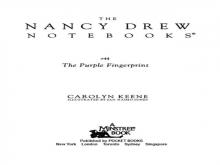 The Purple Fingerprint
The Purple Fingerprint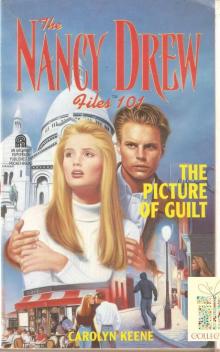 The Picture of Guilt
The Picture of Guilt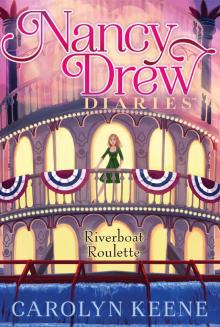 Riverboat Roulette
Riverboat Roulette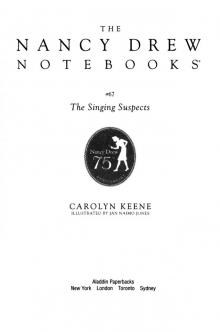 The Singing Suspects
The Singing Suspects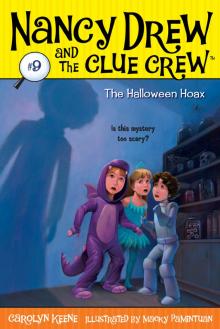 The Halloween Hoax
The Halloween Hoax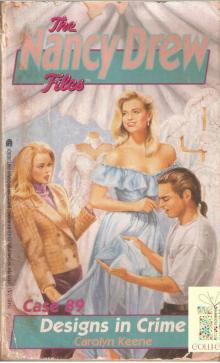 089 Designs in Crime
089 Designs in Crime The Hidden Treasures
The Hidden Treasures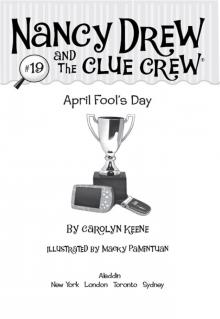 April Fool's Day
April Fool's Day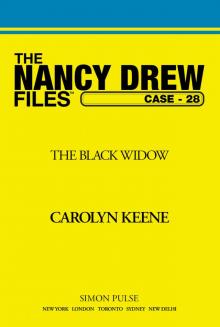 The Black Widow
The Black Widow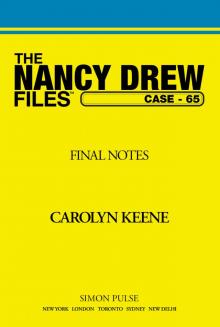 Final Notes
Final Notes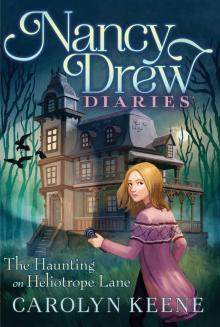 The Haunting on Heliotrope Lane
The Haunting on Heliotrope Lane The Runaway Bride
The Runaway Bride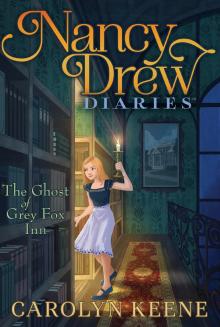 The Ghost of Grey Fox Inn
The Ghost of Grey Fox Inn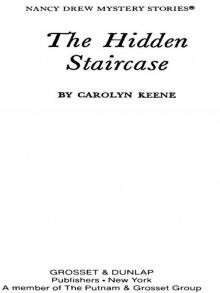 The Hidden Staircase
The Hidden Staircase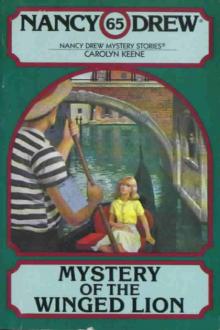 Mystery of the Winged Lion
Mystery of the Winged Lion Over the Edge
Over the Edge The Circus Scare
The Circus Scare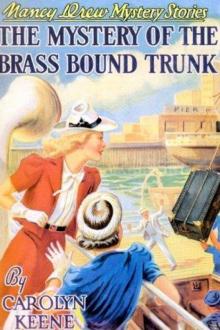 The Mystery of the Brass-Bound Trunk
The Mystery of the Brass-Bound Trunk Ski School Sneak
Ski School Sneak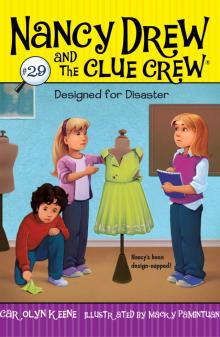 Designed for Disaster
Designed for Disaster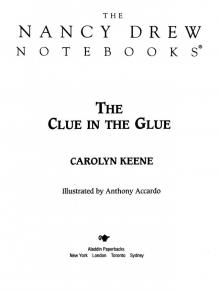 The Clue in the Glue
The Clue in the Glue Cold as Ice
Cold as Ice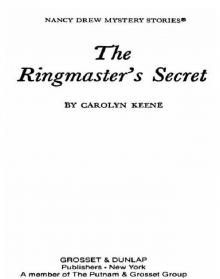 The Ringmaster's Secret
The Ringmaster's Secret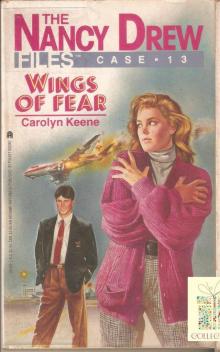 013 Wings of Fear
013 Wings of Fear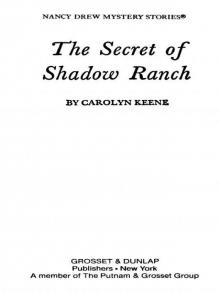 The Secret of Shadow Ranch
The Secret of Shadow Ranch Not Nice on Ice
Not Nice on Ice Earth Day Escapade
Earth Day Escapade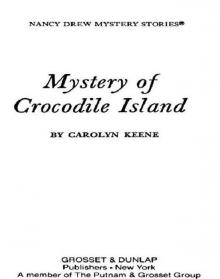 Mystery of Crocodile Island
Mystery of Crocodile Island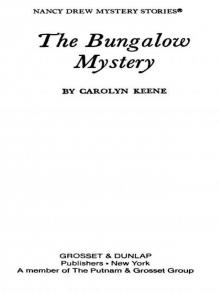 The Bungalow Mystery
The Bungalow Mystery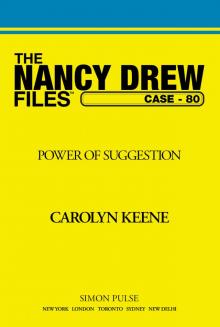 Power of Suggestion
Power of Suggestion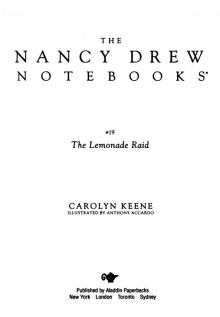 The Lemonade Raid
The Lemonade Raid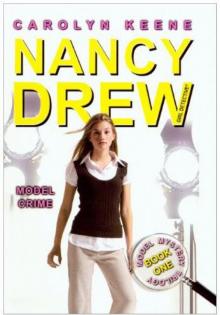 Model Crime
Model Crime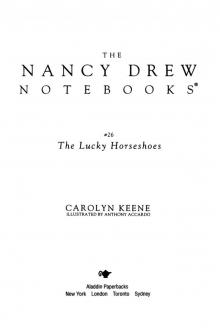 The Lucky Horseshoes
The Lucky Horseshoes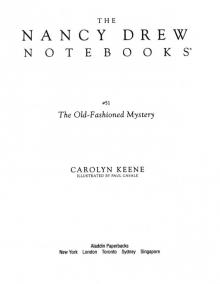 The Secret of the Old Clock
The Secret of the Old Clock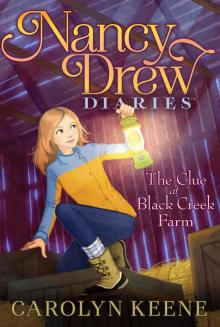 The Clue at Black Creek Farm
The Clue at Black Creek Farm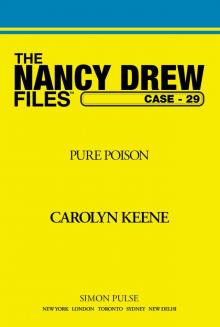 Pure Poison
Pure Poison Nobody's Business
Nobody's Business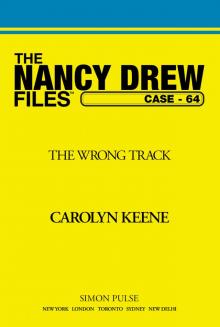 Wrong Track
Wrong Track Chick-Napped!
Chick-Napped!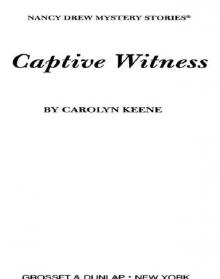 Captive Witness
Captive Witness If Looks Could Kill
If Looks Could Kill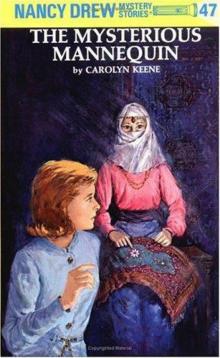 The Mysterious Mannequin
The Mysterious Mannequin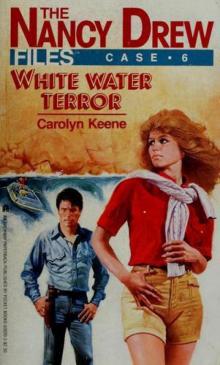 White Water Terror
White Water Terror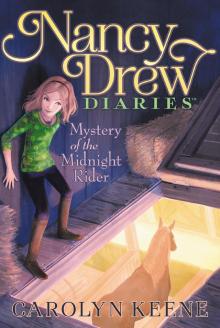 Mystery of the Midnight Rider
Mystery of the Midnight Rider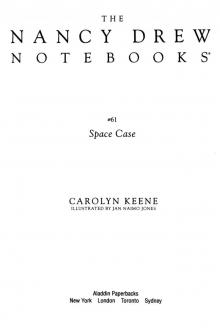 Space Case
Space Case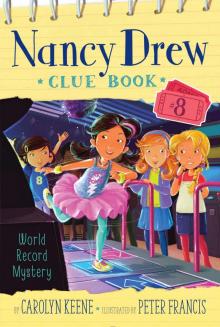 World Record Mystery
World Record Mystery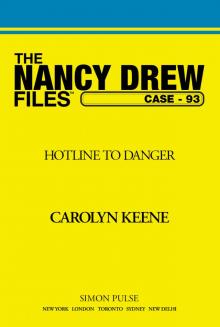 Hotline to Danger
Hotline to Danger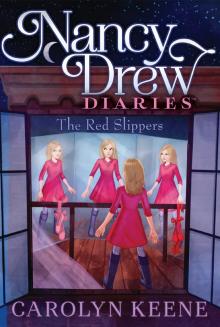 The Red Slippers
The Red Slippers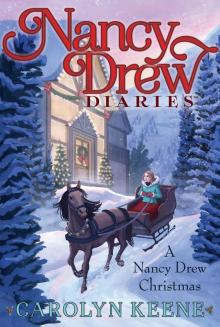 A Crime for Christmas
A Crime for Christmas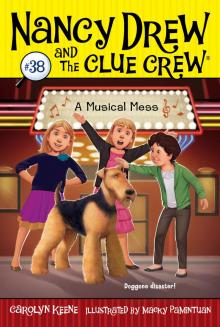 A Musical Mess
A Musical Mess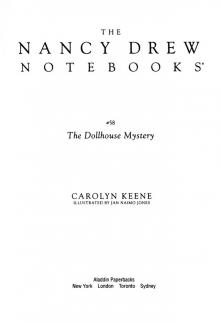 The Dollhouse Mystery
The Dollhouse Mystery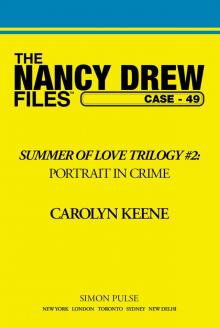 Portrait in Crime
Portrait in Crime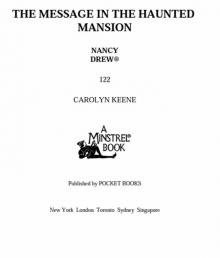 The Message in the Haunted Mansion
The Message in the Haunted Mansion Playing With Fire
Playing With Fire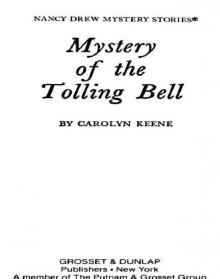 Mystery of the Tolling Bell
Mystery of the Tolling Bell Cutting Edge
Cutting Edge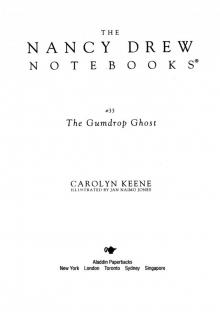 The Gumdrop Ghost
The Gumdrop Ghost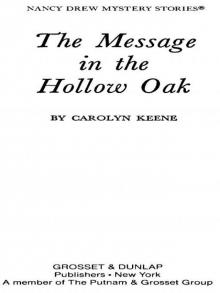 The Message in the Hollow Oak
The Message in the Hollow Oak Trial by Fire
Trial by Fire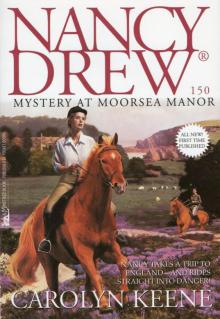 Mystery at Moorsea Manor
Mystery at Moorsea Manor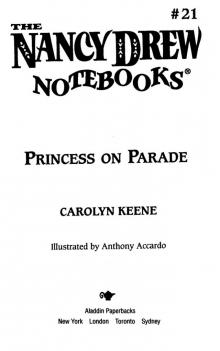 Princess on Parade
Princess on Parade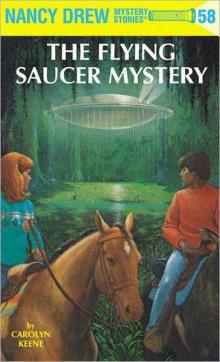 The Flying Saucer Mystery
The Flying Saucer Mystery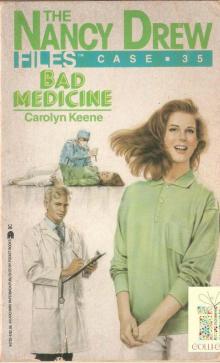 035 Bad Medicine
035 Bad Medicine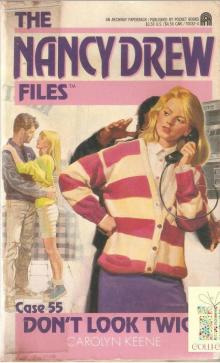 055 Don't Look Twice
055 Don't Look Twice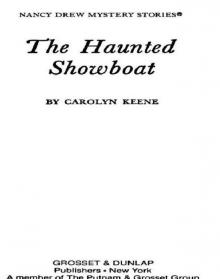 The Haunted Showboat
The Haunted Showboat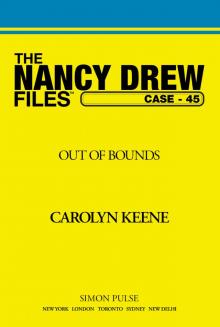 Out of Bounds
Out of Bounds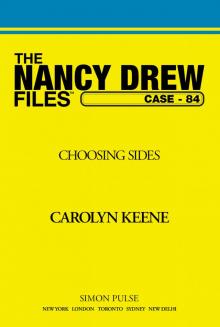 Choosing Sides
Choosing Sides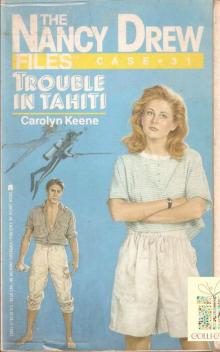 031 Trouble in Tahiti
031 Trouble in Tahiti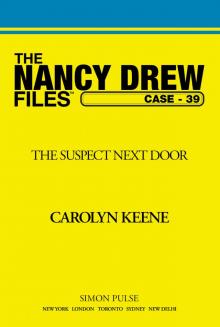 The Suspect Next Door
The Suspect Next Door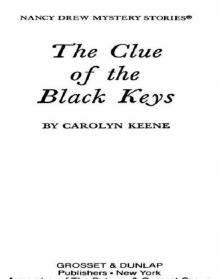 The Clue of the Black Keys
The Clue of the Black Keys The Secret Santa
The Secret Santa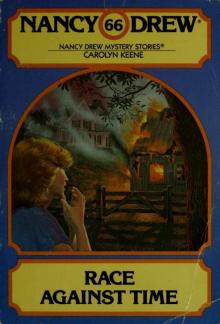 Race Against Time
Race Against Time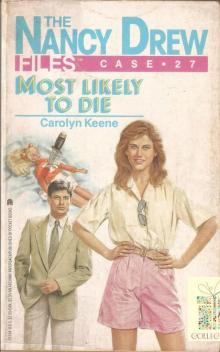 027 Most Likely to Die
027 Most Likely to Die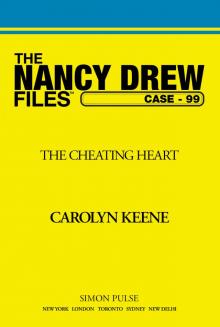 The Cheating Heart
The Cheating Heart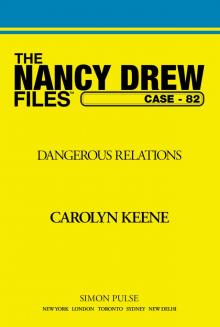 Dangerous Relations
Dangerous Relations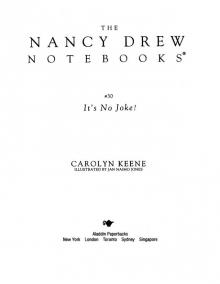 It's No Joke!
It's No Joke!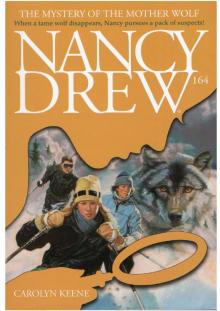 The Mystery of the Mother Wolf
The Mystery of the Mother Wolf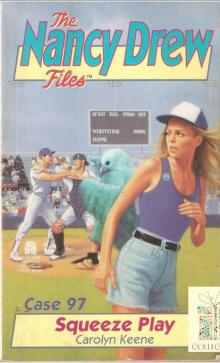 097 Squeeze Play
097 Squeeze Play Secret at Mystic Lake
Secret at Mystic Lake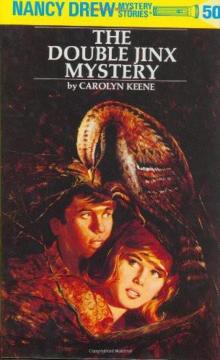 The Double Jinx Mystery
The Double Jinx Mystery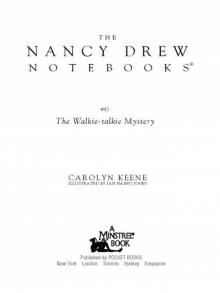 The Walkie Talkie Mystery
The Walkie Talkie Mystery The Case of the Vanishing Veil
The Case of the Vanishing Veil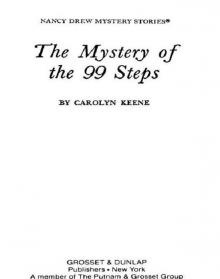 The Mystery of the 99 Steps
The Mystery of the 99 Steps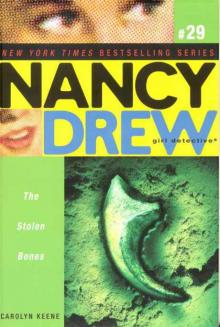 The Stolen Bones
The Stolen Bones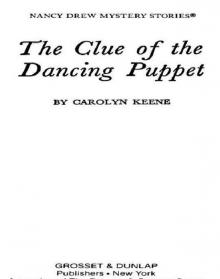 The Clue of the Dancing Puppet
The Clue of the Dancing Puppet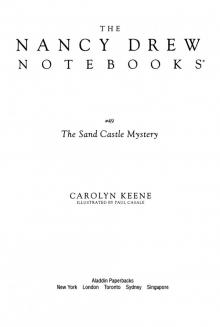 The Sand Castle Mystery
The Sand Castle Mystery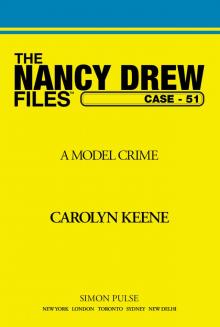 A Model Crime
A Model Crime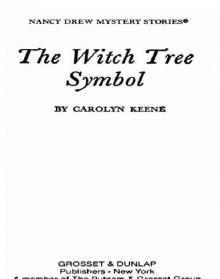 The Witch Tree Symbol
The Witch Tree Symbol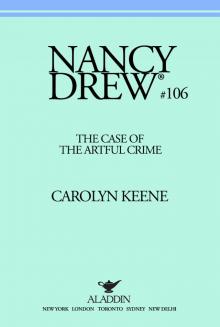 The Case of the Artful Crime
The Case of the Artful Crime Mall Madness
Mall Madness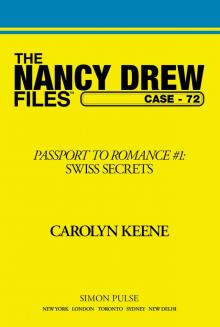 Swiss Secrets
Swiss Secrets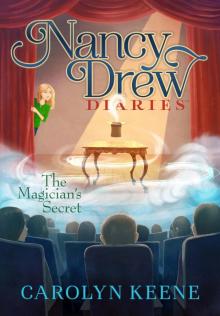 The Magician's Secret
The Magician's Secret Tall, Dark and Deadly
Tall, Dark and Deadly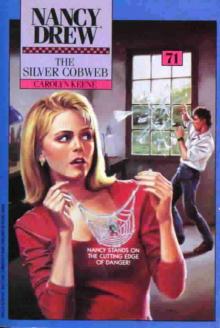 The Silver Cobweb
The Silver Cobweb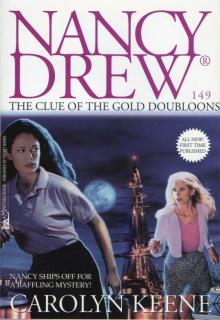 The Clue of the Gold Doubloons
The Clue of the Gold Doubloons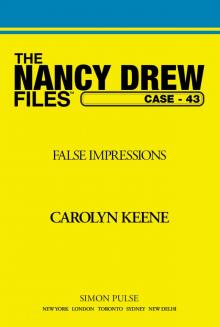 False Impressions
False Impressions Model Suspect
Model Suspect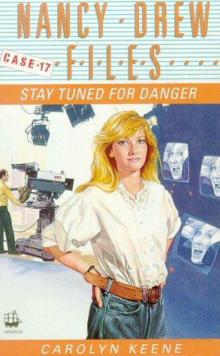 Stay Tuned for Danger
Stay Tuned for Danger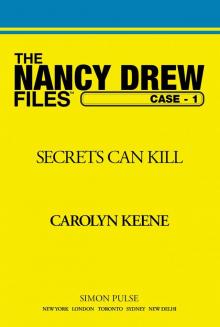 Secrets Can Kill
Secrets Can Kill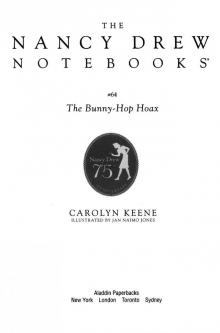 The Bunny-Hop Hoax
The Bunny-Hop Hoax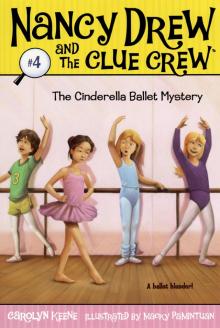 The Cinderella Ballet Mystery
The Cinderella Ballet Mystery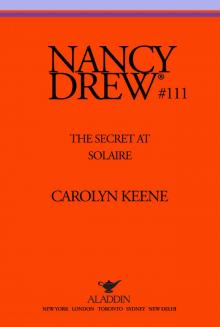 The Secret at Solaire
The Secret at Solaire Trash or Treasure?
Trash or Treasure? The Missing Horse Mystery
The Missing Horse Mystery The Lost Locket
The Lost Locket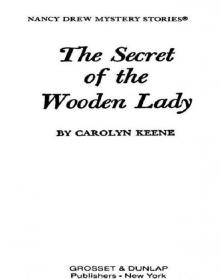 The Secret of the Wooden Lady
The Secret of the Wooden Lady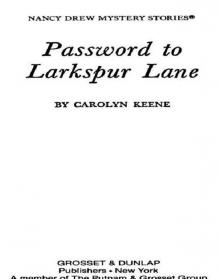 Password to Larkspur Lane
Password to Larkspur Lane Movie Madness
Movie Madness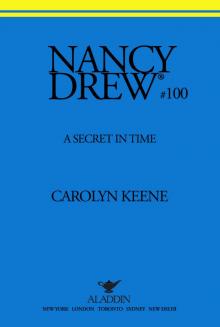 A Secret in Time
A Secret in Time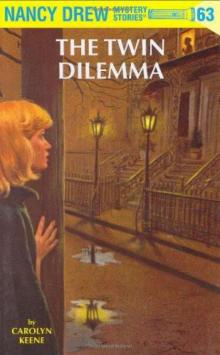 The Twin Dilemma
The Twin Dilemma Candy Is Dandy
Candy Is Dandy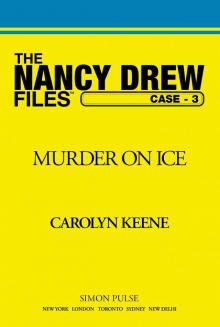 Murder on Ice
Murder on Ice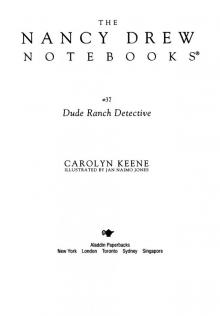 Dude Ranch Detective
Dude Ranch Detective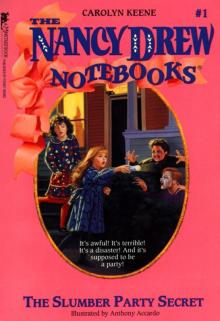 The Slumber Party Secret
The Slumber Party Secret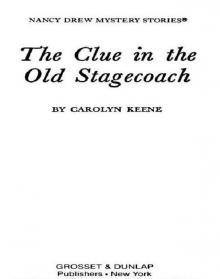 The Clue in the Old Stagecoach
The Clue in the Old Stagecoach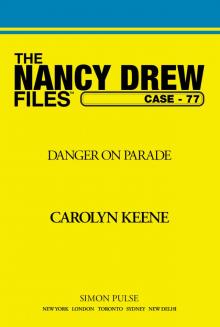 Danger on Parade
Danger on Parade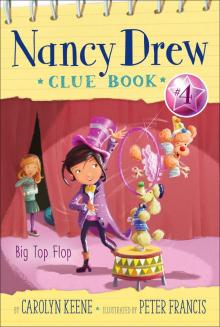 Big Top Flop
Big Top Flop Strangers on a Train
Strangers on a Train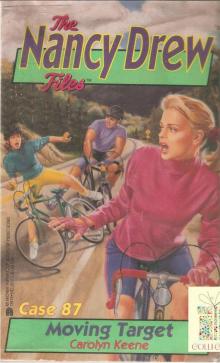 087 Moving Target
087 Moving Target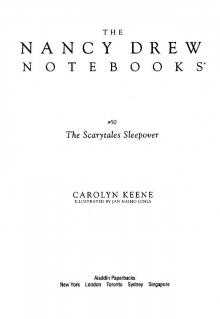 The Scarytales Sleepover
The Scarytales Sleepover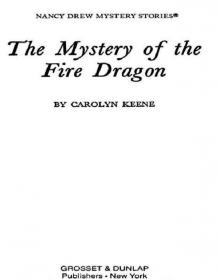 The Mystery of the Fire Dragon
The Mystery of the Fire Dragon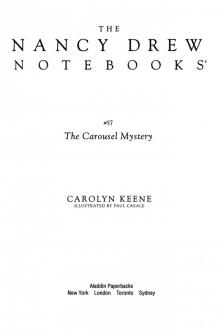 The Carousel Mystery
The Carousel Mystery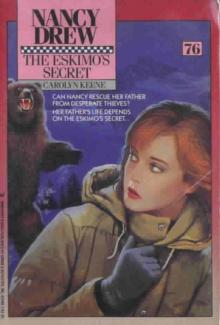 The Eskimo's Secret
The Eskimo's Secret Thrill on the Hill
Thrill on the Hill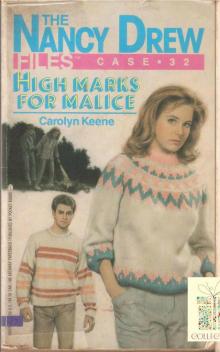 032 High Marks for Malice
032 High Marks for Malice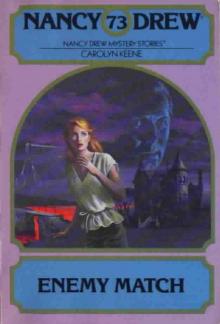 Enemy Match
Enemy Match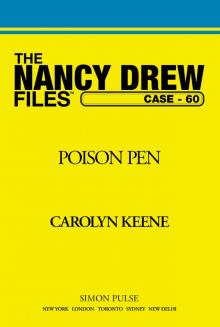 Poison Pen
Poison Pen Lights, Camera . . . Cats!
Lights, Camera . . . Cats! Lost in the Everglades
Lost in the Everglades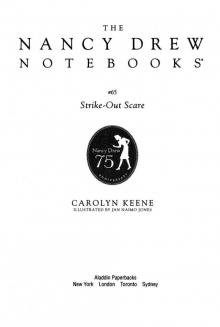 Strike-Out Scare
Strike-Out Scare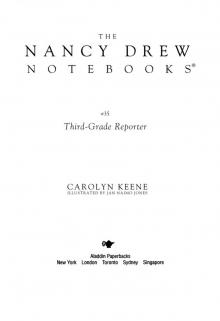 Third-Grade Reporter
Third-Grade Reporter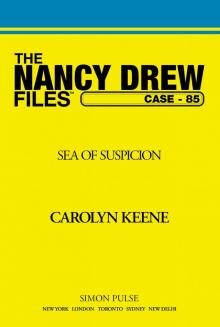 Sea of Suspicion
Sea of Suspicion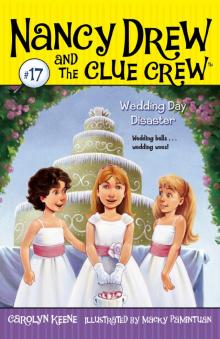 Wedding Day Disaster
Wedding Day Disaster The Make-A-Pet Mystery
The Make-A-Pet Mystery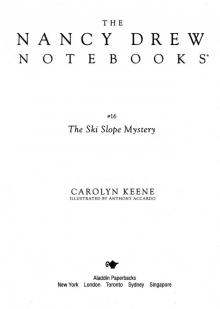 The Ski Slope Mystery
The Ski Slope Mystery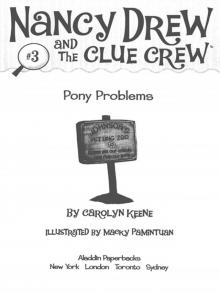 Pony Problems
Pony Problems Candy Kingdom Chaos
Candy Kingdom Chaos The Sign in the Smoke
The Sign in the Smoke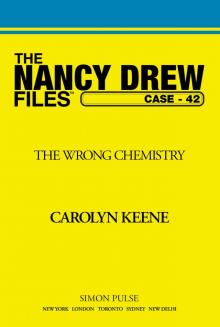 The Wrong Chemistry
The Wrong Chemistry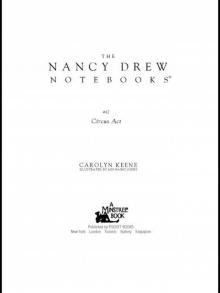 Circus Act
Circus Act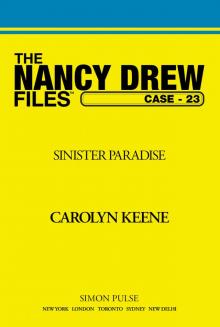 Sinister Paradise
Sinister Paradise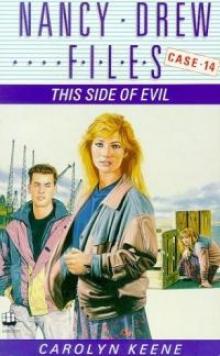 This Side of Evil
This Side of Evil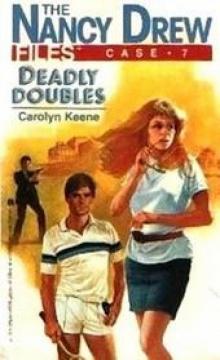 Deadly Doubles
Deadly Doubles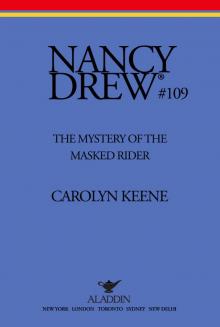 The Mystery of the Masked Rider
The Mystery of the Masked Rider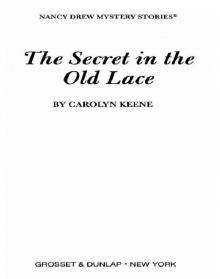 The Secret in the Old Lace
The Secret in the Old Lace The Pen Pal Puzzle
The Pen Pal Puzzle Without a Trace
Without a Trace Whose Pet Is Best?
Whose Pet Is Best?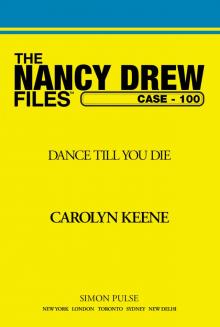 Dance Till You Die
Dance Till You Die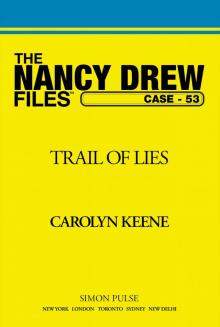 Trail of Lies
Trail of Lies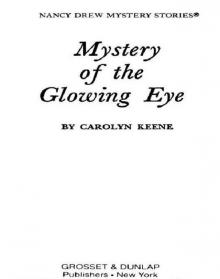 Mystery of the Glowing Eye
Mystery of the Glowing Eye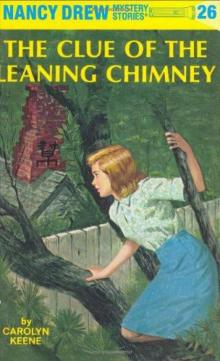 The Clue of the Leaning Chimney
The Clue of the Leaning Chimney The Crook Who Took the Book
The Crook Who Took the Book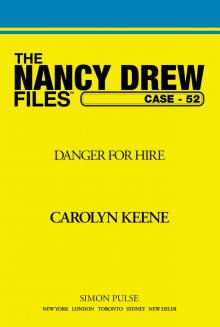 Danger for Hire
Danger for Hire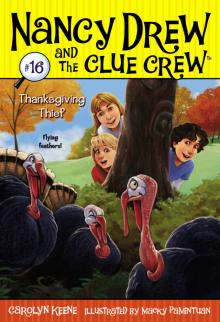 Thanksgiving Thief
Thanksgiving Thief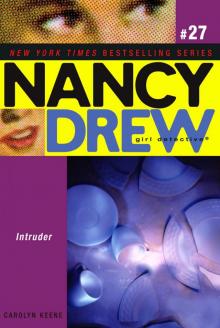 Intruder!
Intruder!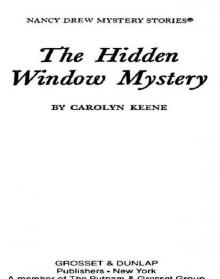 The Hidden Window Mystery
The Hidden Window Mystery Win, Place or Die
Win, Place or Die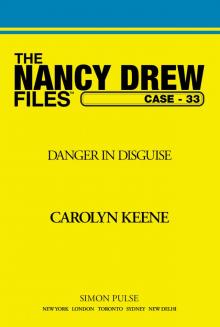 Danger in Disguise
Danger in Disguise The Best Detective
The Best Detective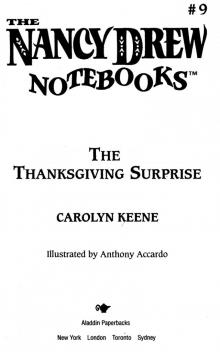 The Thanksgiving Surprise
The Thanksgiving Surprise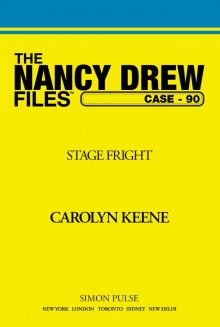 Stage Fright
Stage Fright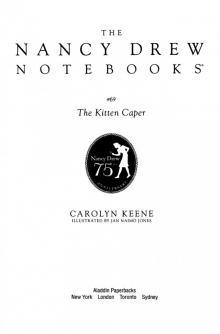 The Kitten Caper
The Kitten Caper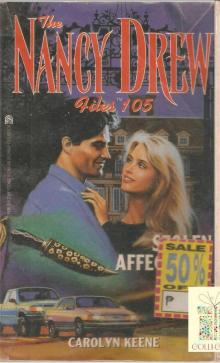 Stolen Affections
Stolen Affections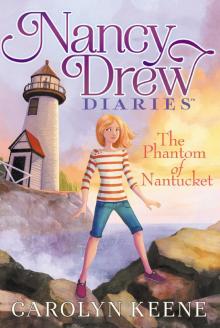 The Phantom of Nantucket
The Phantom of Nantucket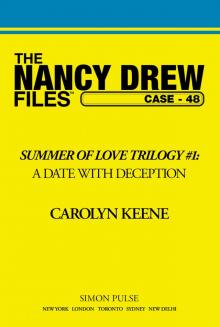 Date With Deception
Date With Deception Cooking Camp Disaster
Cooking Camp Disaster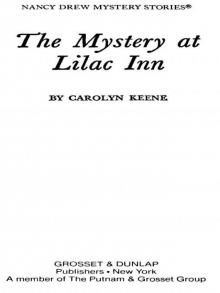 The Mystery at Lilac Inn
The Mystery at Lilac Inn Springtime Crime
Springtime Crime Action!
Action! Into Thin Air
Into Thin Air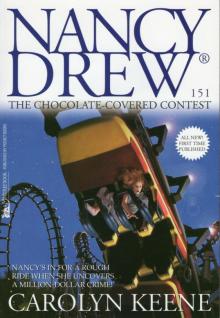 The Chocolate-Covered Contest
The Chocolate-Covered Contest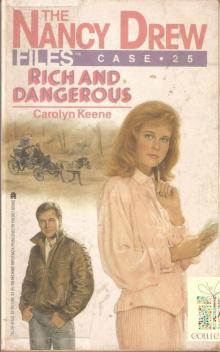 025 Rich and Dangerous
025 Rich and Dangerous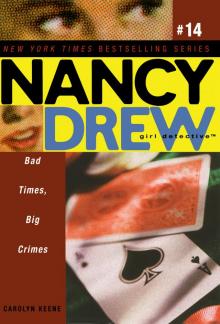 Bad Times, Big Crimes
Bad Times, Big Crimes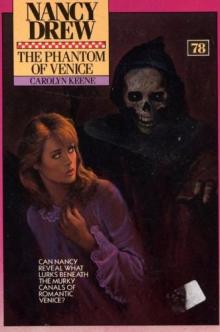 078 The Phantom Of Venice
078 The Phantom Of Venice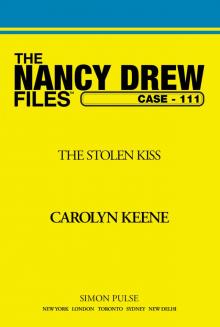 The Stolen Kiss
The Stolen Kiss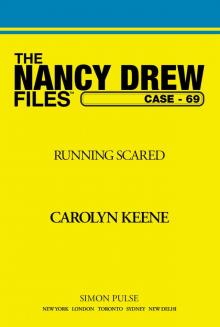 Running Scared
Running Scared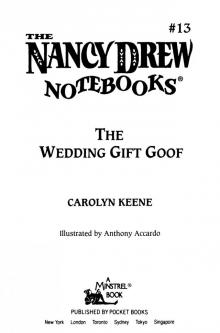 The Wedding Gift Goof
The Wedding Gift Goof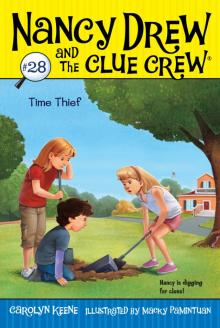 Time Thief
Time Thief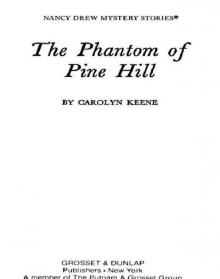 The Phantom of Pine Hill
The Phantom of Pine Hill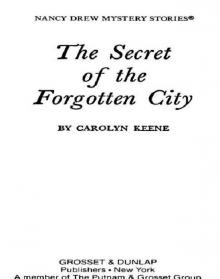 The Secret of the Forgotten City
The Secret of the Forgotten City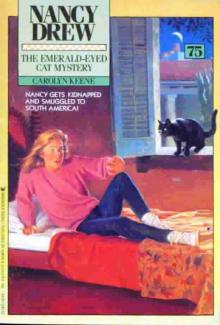 The Emerald-Eyed Cat Mystery
The Emerald-Eyed Cat Mystery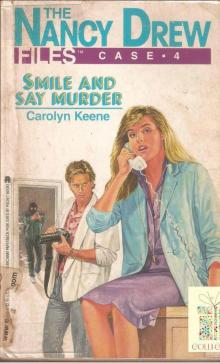 004 Smile and Say Murder
004 Smile and Say Murder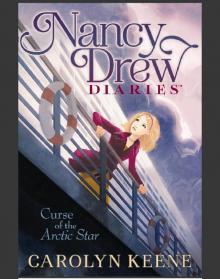 Curse of the Arctic Star
Curse of the Arctic Star Dinosaur Alert!
Dinosaur Alert!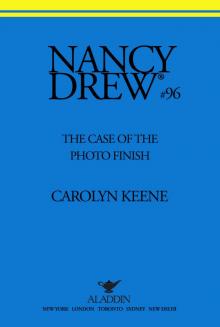 The Case of the Photo Finish
The Case of the Photo Finish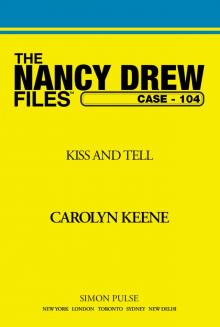 Kiss and Tell
Kiss and Tell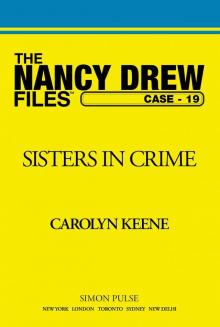 Sisters in Crime
Sisters in Crime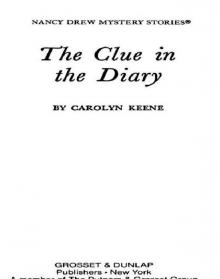 The Clue in the Diary
The Clue in the Diary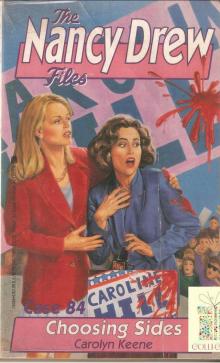 084 Choosing Sides
084 Choosing Sides Haunting of Horse Island
Haunting of Horse Island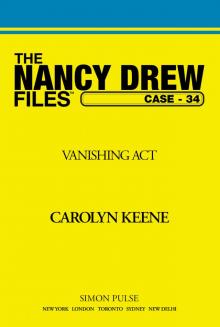 Vanishing Act
Vanishing Act The Big Island Burglary
The Big Island Burglary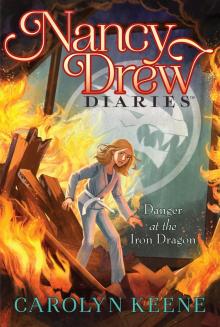 Danger at the Iron Dragon
Danger at the Iron Dragon Pets on Parade
Pets on Parade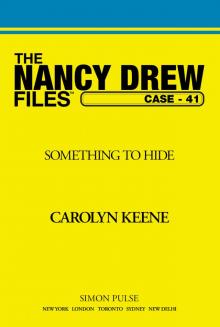 Something to Hide
Something to Hide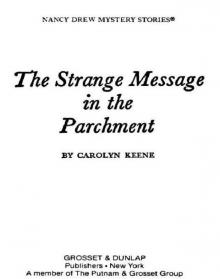 The Strange Message in the Parchment
The Strange Message in the Parchment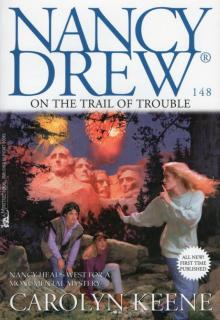 On the Trail of Trouble
On the Trail of Trouble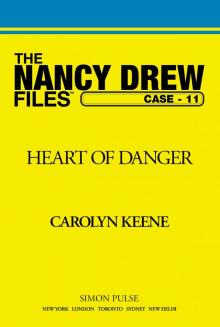 Heart of Danger
Heart of Danger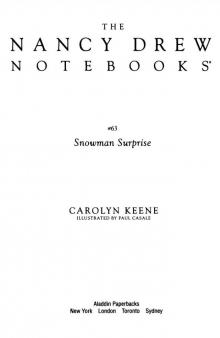 The Snowman Surprise
The Snowman Surprise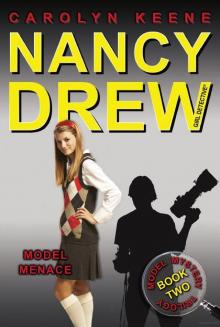 Model Menace
Model Menace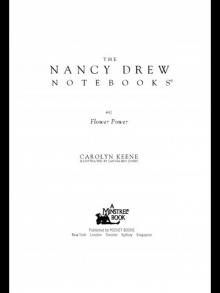 Flower Power
Flower Power The Great Goat Gaffe
The Great Goat Gaffe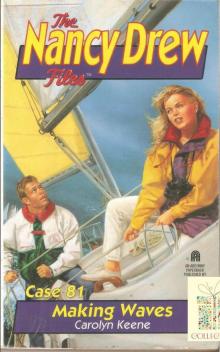 081 Making Waves
081 Making Waves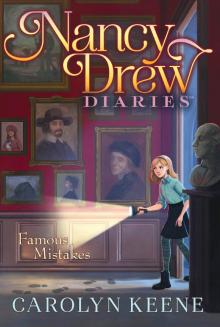 Famous Mistakes
Famous Mistakes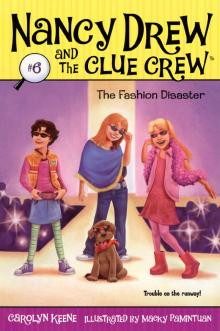 The Fashion Disaster
The Fashion Disaster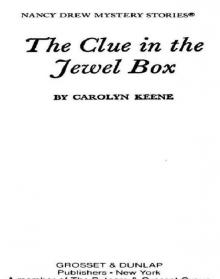 The Clue in the Jewel Box
The Clue in the Jewel Box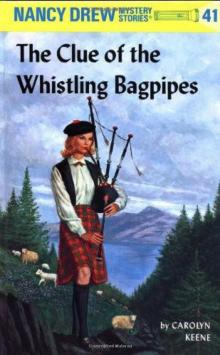 The Clue of the Whistling Bagpipes
The Clue of the Whistling Bagpipes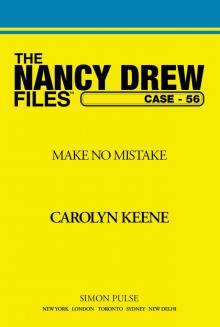 Make No Mistake
Make No Mistake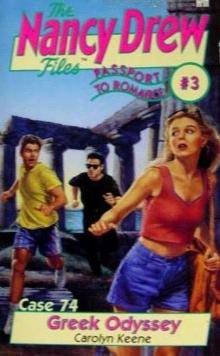 Greek Odyssey
Greek Odyssey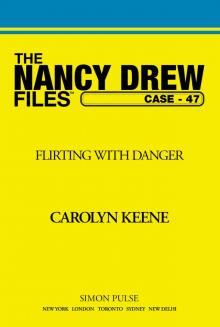 Flirting With Danger
Flirting With Danger Double Take
Double Take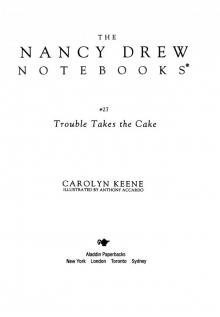 Trouble Takes the Cake
Trouble Takes the Cake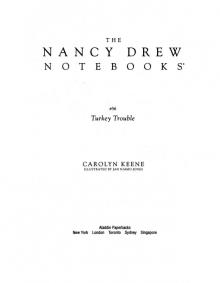 Turkey Trouble
Turkey Trouble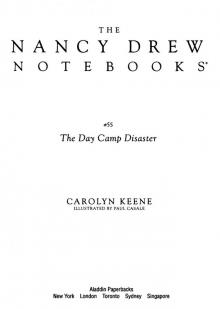 The Day Camp Disaster
The Day Camp Disaster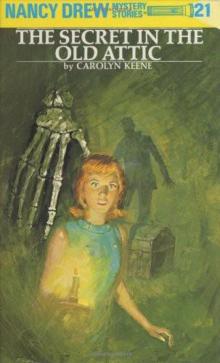 The Secret in the Old Attic
The Secret in the Old Attic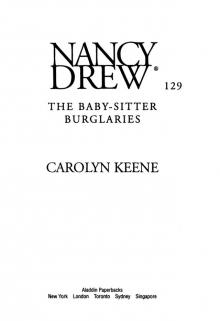 The Baby-Sitter Burglaries
The Baby-Sitter Burglaries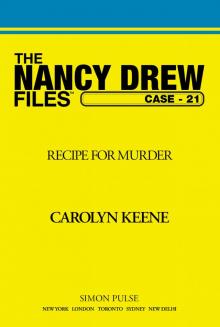 Recipe for Murder
Recipe for Murder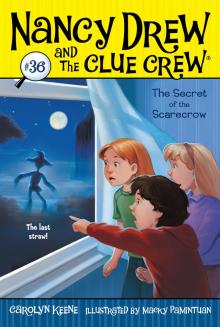 The Secret of the Scarecrow
The Secret of the Scarecrow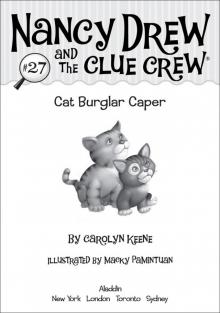 Cat Burglar Caper
Cat Burglar Caper Turkey Trot Plot
Turkey Trot Plot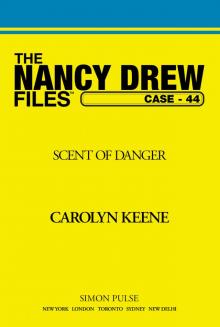 Scent of Danger
Scent of Danger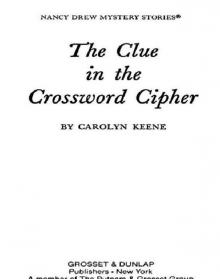 The Clue in the Crossword Cipher
The Clue in the Crossword Cipher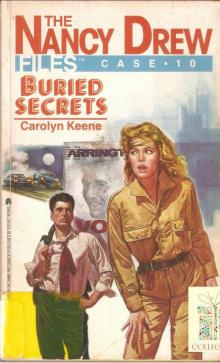 010 Buried Secrets
010 Buried Secrets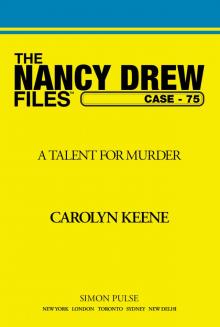 A Talent for Murder
A Talent for Murder The Triple Hoax
The Triple Hoax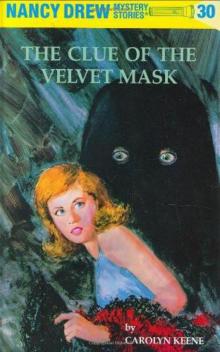 The Clue of the Velvet Mask
The Clue of the Velvet Mask Last Lemonade Standing
Last Lemonade Standing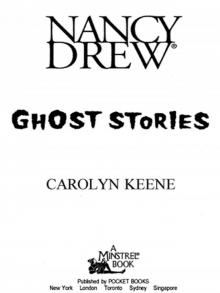 The Ghost of Blackwood Hall
The Ghost of Blackwood Hall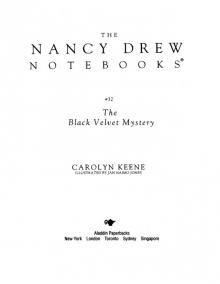 The Black Velvet Mystery
The Black Velvet Mystery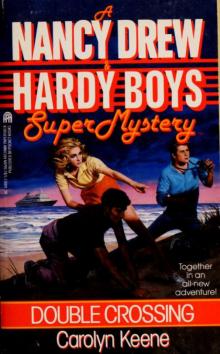 Double Crossing
Double Crossing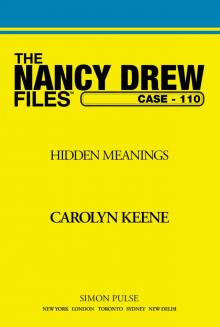 Hidden Meanings
Hidden Meanings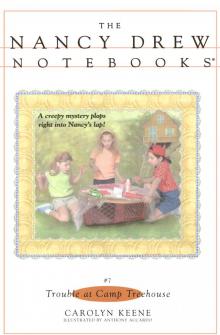 Trouble at Camp Treehouse
Trouble at Camp Treehouse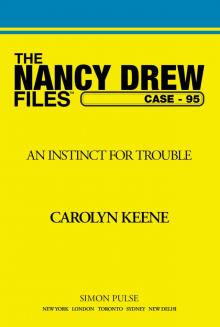 An Instinct for Trouble
An Instinct for Trouble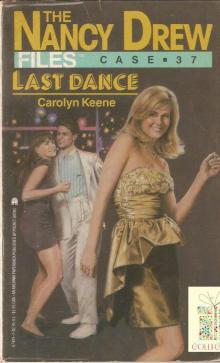 037 Last Dance
037 Last Dance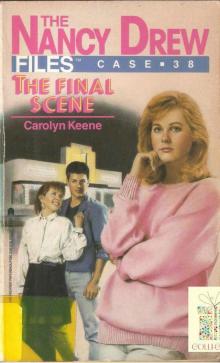 038 The Final Scene
038 The Final Scene Duck Derby Debacle
Duck Derby Debacle The Pumpkin Patch Puzzle
The Pumpkin Patch Puzzle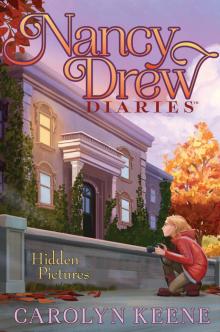 Hidden Pictures
Hidden Pictures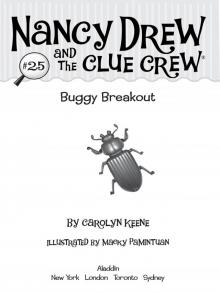 Buggy Breakout
Buggy Breakout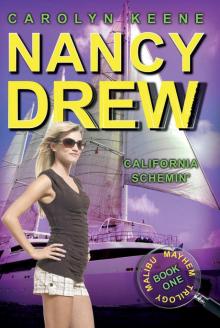 California Schemin'
California Schemin'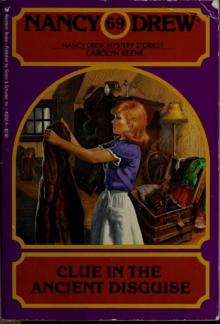 Clue in the Ancient Disguise
Clue in the Ancient Disguise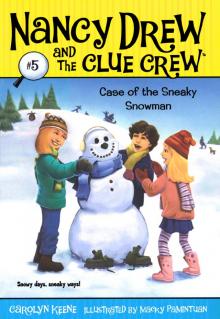 Case of the Sneaky Snowman
Case of the Sneaky Snowman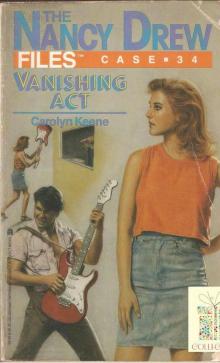 034 Vanishing Act
034 Vanishing Act A Script for Danger
A Script for Danger The Flower Show Fiasco
The Flower Show Fiasco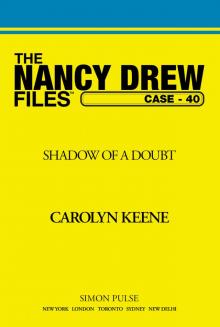 Shadow of a Doubt
Shadow of a Doubt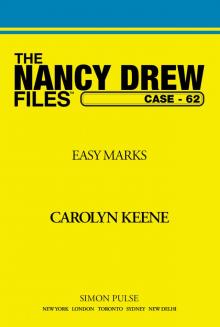 Easy Marks
Easy Marks Alien in the Classroom
Alien in the Classroom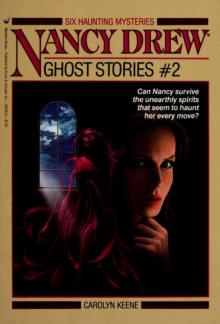 Ghost Stories, #2 (Nancy Drew)
Ghost Stories, #2 (Nancy Drew)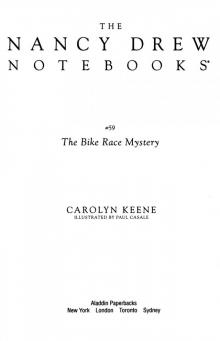 The Bike Race Mystery
The Bike Race Mystery False Pretenses
False Pretenses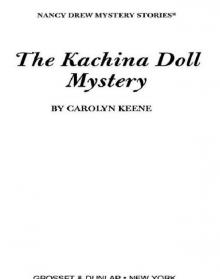 The Kachina Doll Mystery
The Kachina Doll Mystery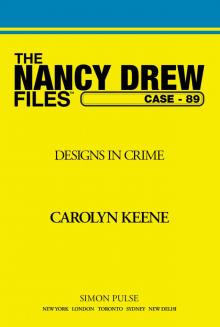 Designs in Crime
Designs in Crime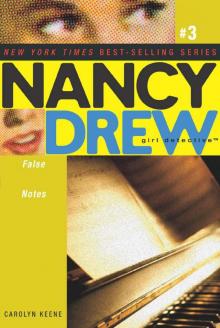 False Notes
False Notes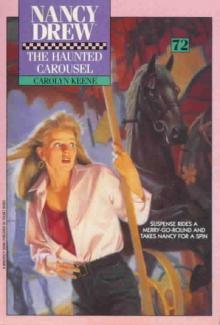 The Haunted Carousel
The Haunted Carousel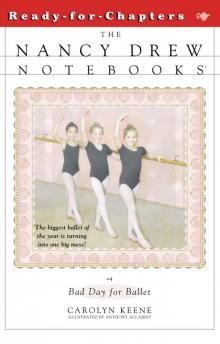 Bad Day for Ballet
Bad Day for Ballet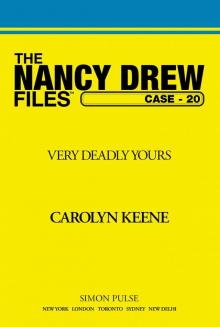 Very Deadly Yours
Very Deadly Yours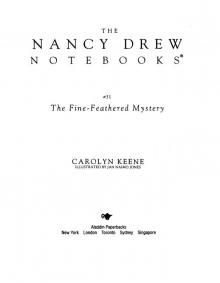 The Fine-Feathered Mystery
The Fine-Feathered Mystery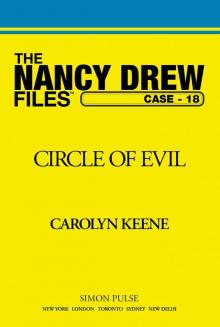 Circle of Evil
Circle of Evil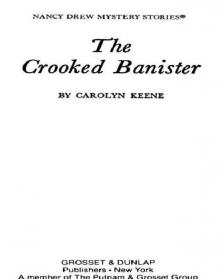 The Crooked Banister
The Crooked Banister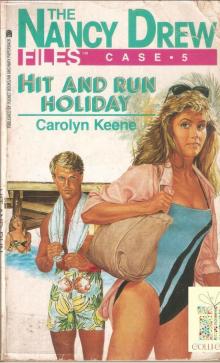 005 Hit and Run Holiday
005 Hit and Run Holiday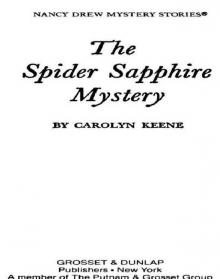 The Spider Sapphire Mystery
The Spider Sapphire Mystery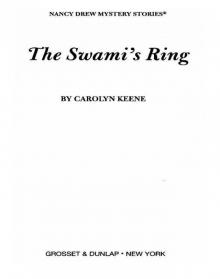 The Swami's Ring
The Swami's Ring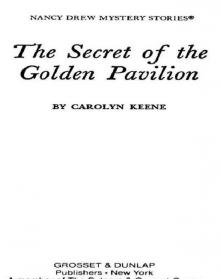 The Secret of the Golden Pavilion
The Secret of the Golden Pavilion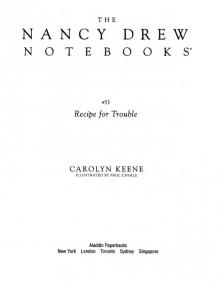 Recipe for Trouble
Recipe for Trouble Betrayed by Love
Betrayed by Love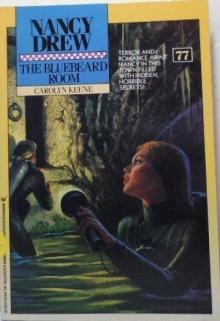 The Bluebeard Room
The Bluebeard Room Sweet Revenge
Sweet Revenge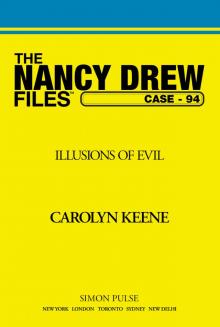 Illusions of Evil
Illusions of Evil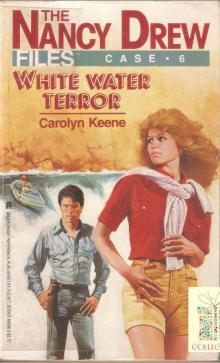 006 White Water Terror
006 White Water Terror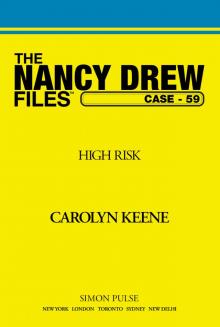 High Risk
High Risk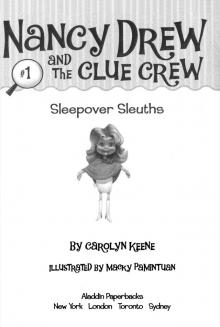 Sleepover Sleuths
Sleepover Sleuths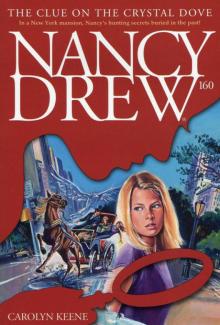 The Clue on the Crystal Dove
The Clue on the Crystal Dove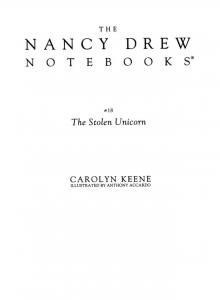 The Stolen Unicorn
The Stolen Unicorn The Professor and the Puzzle
The Professor and the Puzzle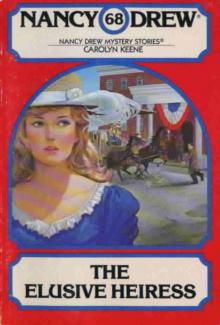 The Elusive Heiress
The Elusive Heiress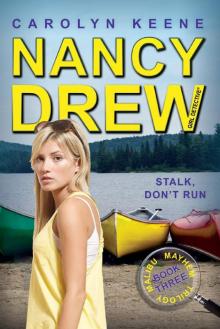 Stalk, Don't Run
Stalk, Don't Run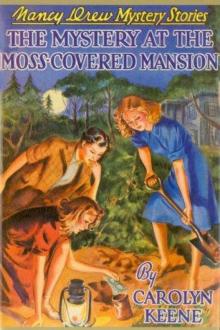 The Mystery at the Moss-Covered Mansion
The Mystery at the Moss-Covered Mansion The Tortoise and the Scare
The Tortoise and the Scare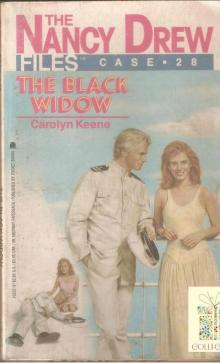 028 The Black Widow
028 The Black Widow Big Worry in Wonderland
Big Worry in Wonderland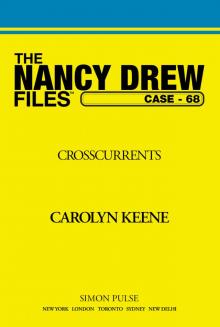 Crosscurrents
Crosscurrents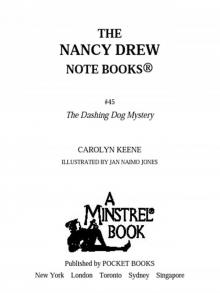 The Dashing Dog Mystery
The Dashing Dog Mystery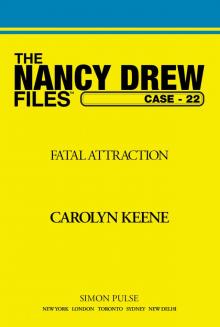 Fatal Attraction
Fatal Attraction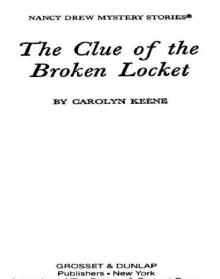 The Clue of the Broken Locket
The Clue of the Broken Locket The Stinky Cheese Surprise
The Stinky Cheese Surprise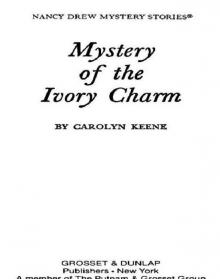 Mystery of the Ivory Charm
Mystery of the Ivory Charm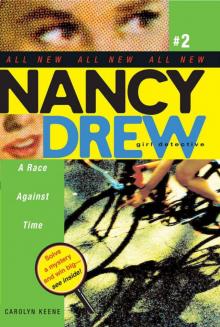 A Race Against Time
A Race Against Time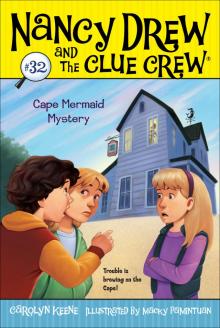 Cape Mermaid Mystery
Cape Mermaid Mystery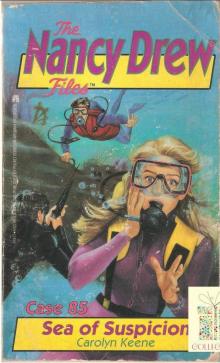 085 Sea of Suspicion
085 Sea of Suspicion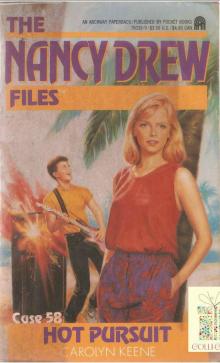 058 Hot Pursuit
058 Hot Pursuit The Secret in the Spooky Woods
The Secret in the Spooky Woods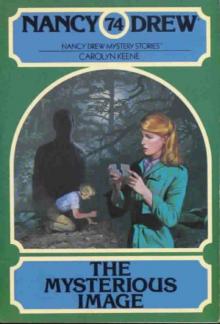 The Mysterious Image
The Mysterious Image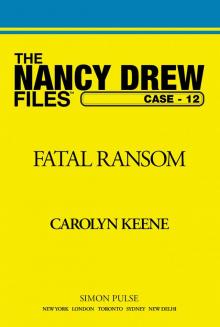 Fatal Ransom
Fatal Ransom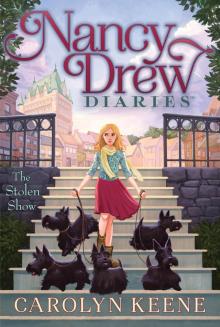 The Stolen Show
The Stolen Show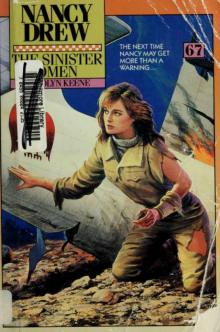 The Sinister Omen
The Sinister Omen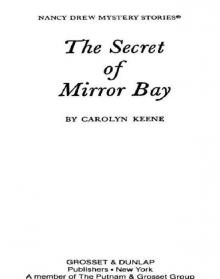 The Secret of Mirror Bay
The Secret of Mirror Bay Rendezvous in Rome
Rendezvous in Rome The Perfect Plot
The Perfect Plot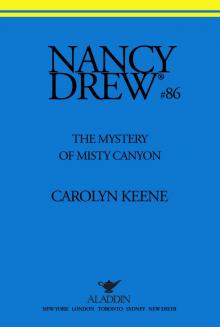 The Mystery of Misty Canyon
The Mystery of Misty Canyon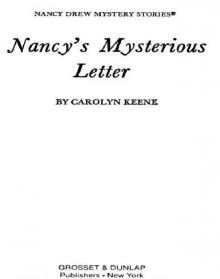 Nancy's Mysterious Letter
Nancy's Mysterious Letter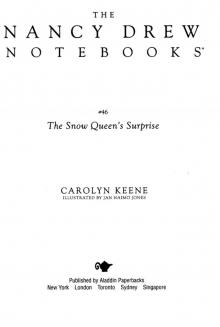 The Snow Queen's Surprise
The Snow Queen's Surprise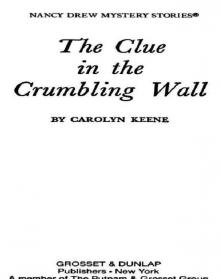 The Clue in the Crumbling Wall
The Clue in the Crumbling Wall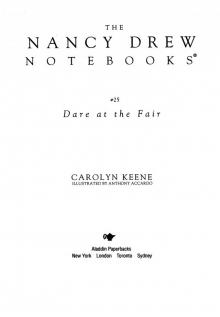 Dare at the Fair
Dare at the Fair Scream for Ice Cream
Scream for Ice Cream A Star Witness
A Star Witness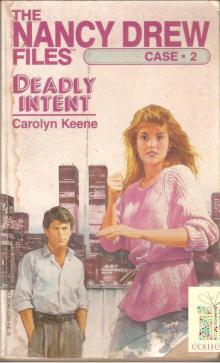 002 Deadly Intent
002 Deadly Intent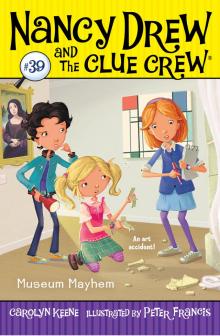 Museum Mayhem
Museum Mayhem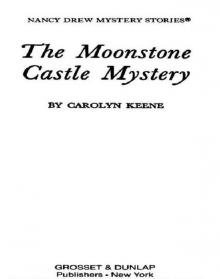 The Moonstone Castle Mystery
The Moonstone Castle Mystery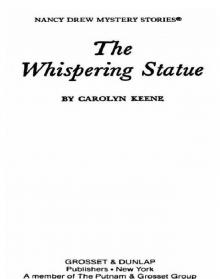 The Whispering Statue
The Whispering Statue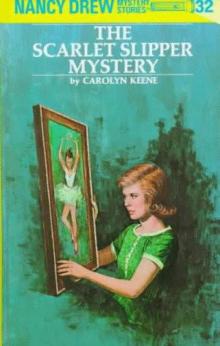 The Scarlet Slipper Mystery
The Scarlet Slipper Mystery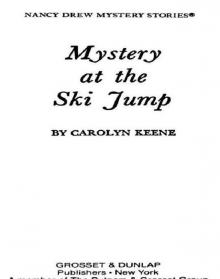 Mystery at the Ski Jump
Mystery at the Ski Jump Hot Pursuit
Hot Pursuit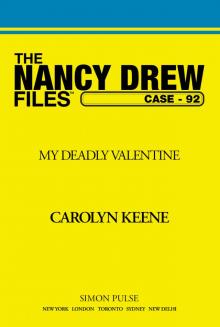 My Deadly Valentine
My Deadly Valentine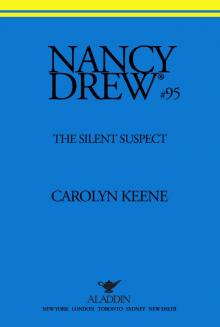 The Silent Suspect
The Silent Suspect Deep Secrets
Deep Secrets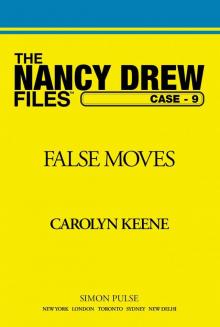 False Moves
False Moves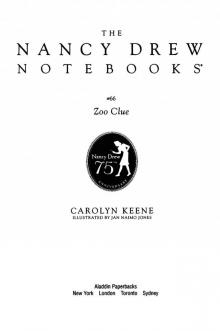 The Zoo Crew
The Zoo Crew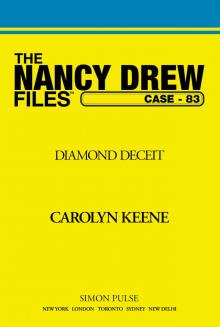 Diamond Deceit
Diamond Deceit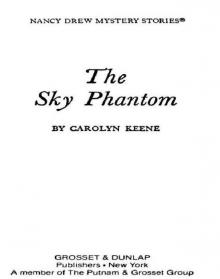 The Sky Phantom
The Sky Phantom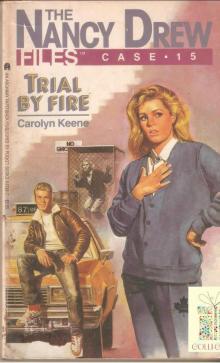 015 Trial by Fire
015 Trial by Fire The Quest of the Missing Map
The Quest of the Missing Map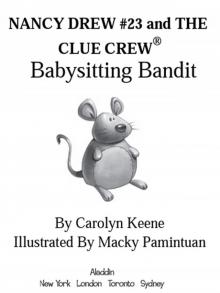 Babysitting Bandit
Babysitting Bandit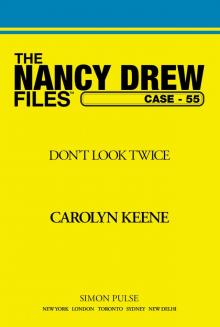 Don't Look Twice
Don't Look Twice Never Say Die
Never Say Die The Soccer Shoe Clue
The Soccer Shoe Clue Pool Party Puzzler
Pool Party Puzzler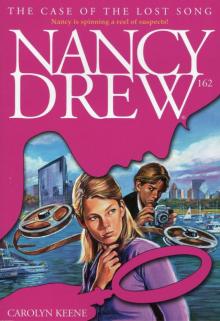 The Case of the Lost Song
The Case of the Lost Song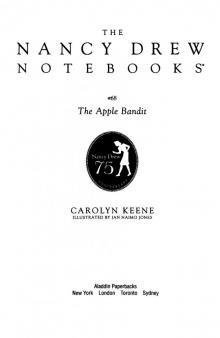 The Apple Bandit
The Apple Bandit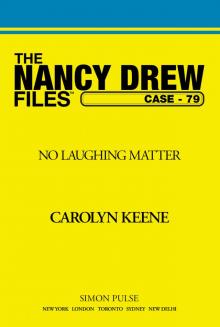 No Laughing Matter
No Laughing Matter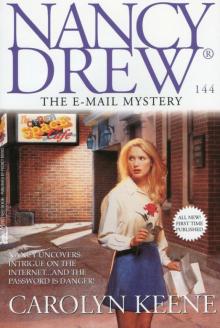 The Thirteenth Pearl
The Thirteenth Pearl Sabotage at Willow Woods
Sabotage at Willow Woods Butterfly Blues
Butterfly Blues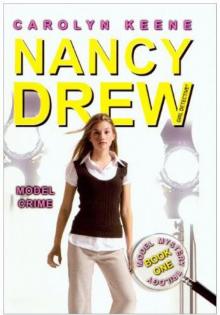 Model Crime 1
Model Crime 1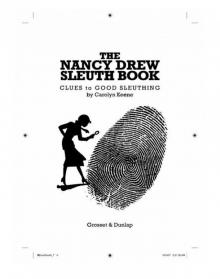 The Nancy Drew Sleuth Book
The Nancy Drew Sleuth Book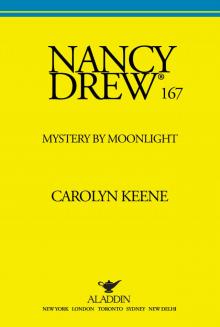 Mystery by Moonlight
Mystery by Moonlight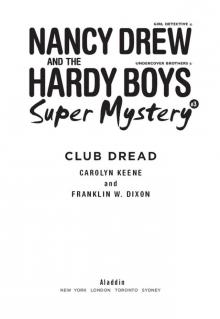 Club Dread
Club Dread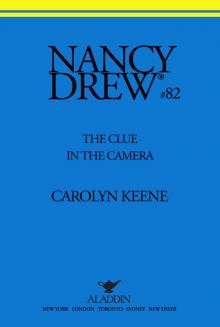 The Clue in the Camera
The Clue in the Camera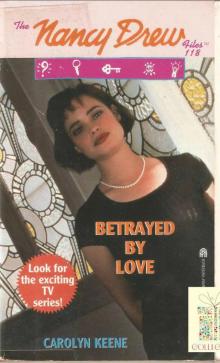 118 Betrayed By Love
118 Betrayed By Love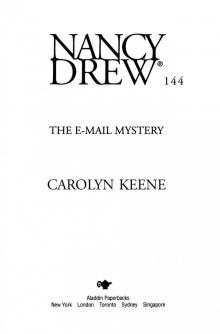 The E-Mail Mystery (Nancy Drew Book 144)
The E-Mail Mystery (Nancy Drew Book 144)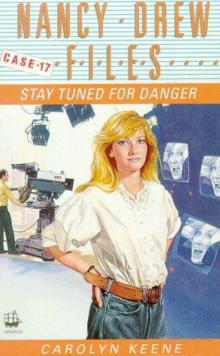 Stay Tuned for Danger: Circle of Evil
Stay Tuned for Danger: Circle of Evil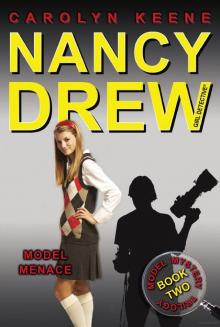 Model Menace 2
Model Menace 2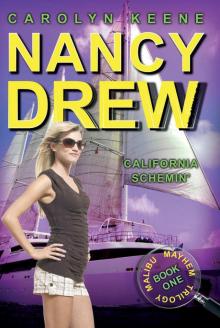 California Schemin': Book One in the Malibu Mayhem Trilogy
California Schemin': Book One in the Malibu Mayhem Trilogy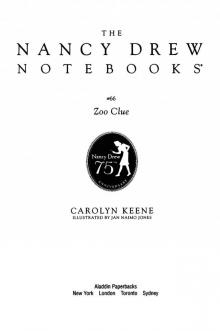 Zoo Clue (Nancy Drew Notebooks)
Zoo Clue (Nancy Drew Notebooks)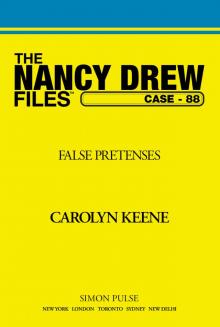 False Pretences
False Pretences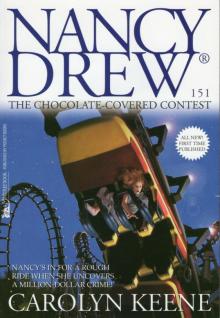 151 The Chocolate-Covered Contest
151 The Chocolate-Covered Contest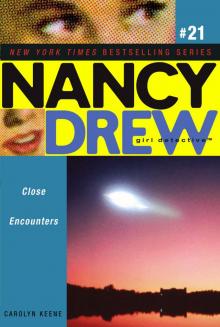 Close Encounters
Close Encounters The Emeral-Eyed Cat Mystery
The Emeral-Eyed Cat Mystery Boo Crew
Boo Crew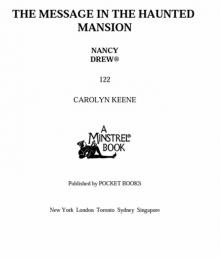 The Message in the Haunted Mansion (Nancy Drew Book 122)
The Message in the Haunted Mansion (Nancy Drew Book 122)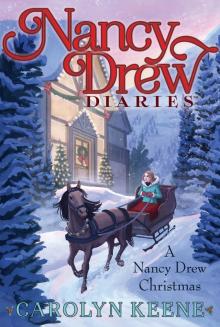 A Nancy Drew Christmas
A Nancy Drew Christmas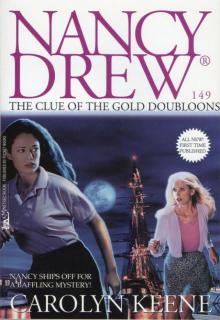 149 The Clue Of The Gold Doubloons
149 The Clue Of The Gold Doubloons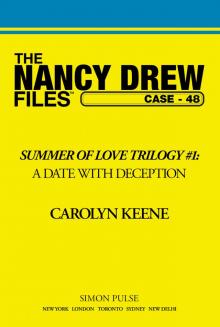 A Date with Deception
A Date with Deception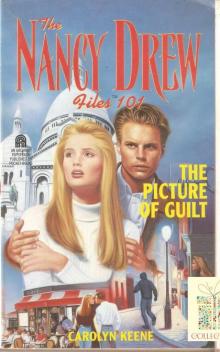 101 The Picture of Guilt
101 The Picture of Guilt The Secret in the Spooky Woods (Nancy Drew Notebooks Book 62)
The Secret in the Spooky Woods (Nancy Drew Notebooks Book 62)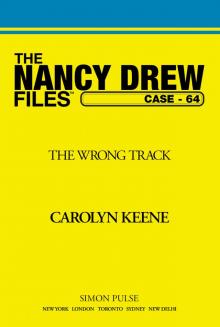 The Wrong Track
The Wrong Track Lights! Camera! Clues!
Lights! Camera! Clues!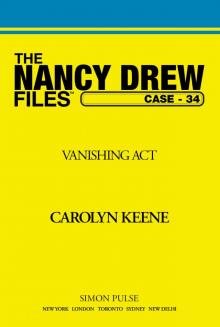 The Vanishing Act
The Vanishing Act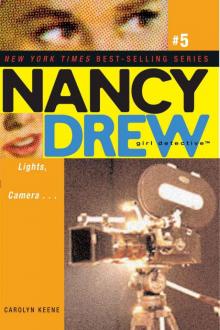 Lights, Camera . . .
Lights, Camera . . . Model Suspect 3
Model Suspect 3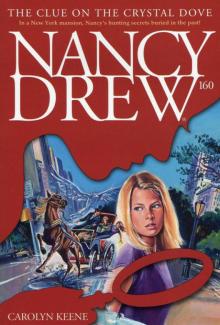 160 The Clue On The Crystal Dove
160 The Clue On The Crystal Dove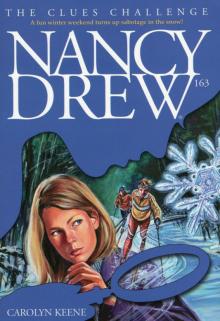 163 The Clues Challenge
163 The Clues Challenge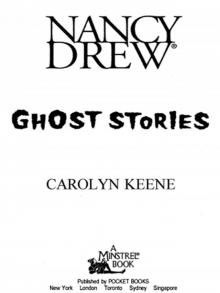 Ghost Stories (Nancy Drew)
Ghost Stories (Nancy Drew)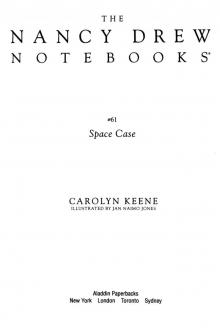 Space Case (Nancy Drew Notebooks Book 61)
Space Case (Nancy Drew Notebooks Book 61)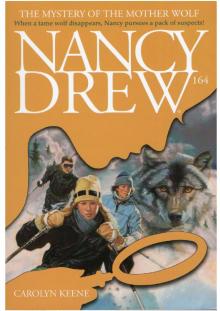 164 The Mystery Of The Mother Wolf
164 The Mystery Of The Mother Wolf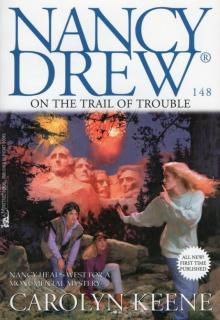 148 On The Trail Of Trouble
148 On The Trail Of Trouble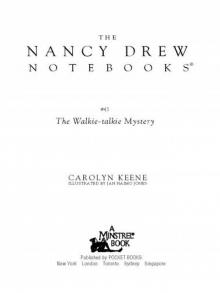 The Walkie-Talkie Mystery
The Walkie-Talkie Mystery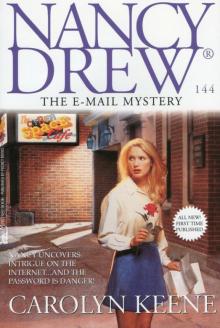 The E-Mail Mystery
The E-Mail Mystery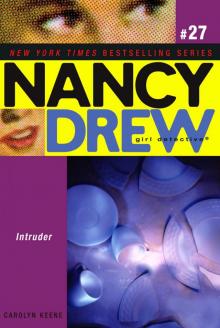 Intruder (Nancy Drew (All New) Girl Detective)
Intruder (Nancy Drew (All New) Girl Detective)![The Stolen Relic [Nancy Drew Girl Detective 007] Read online](http://i1.bookreadfree.com/i2/04/11/the_stolen_relic_nancy_drew_girl_detective_007_preview.jpg) The Stolen Relic [Nancy Drew Girl Detective 007]
The Stolen Relic [Nancy Drew Girl Detective 007]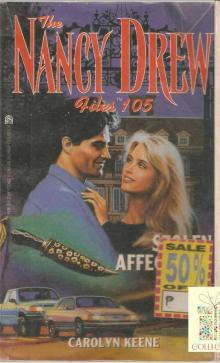 105 Stolen Affections
105 Stolen Affections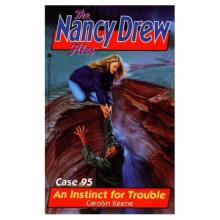 An Instict for Trouble
An Instict for Trouble 161 Lost In The Everglades
161 Lost In The Everglades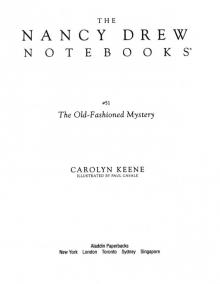 The Old-Fashioned Mystery
The Old-Fashioned Mystery Perfect Plot
Perfect Plot